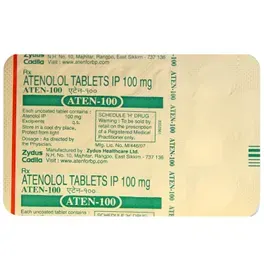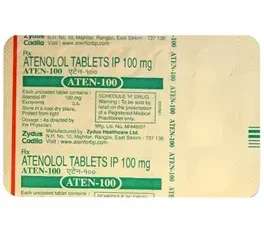Aten 100 Tablet belongs to a class of medicines known as beta-blockers. It is commonly prescribed to treat high blood pressure (hypertension), angina (chest pain), and irregular heart rhythms (arrhythmia). It is also used to prevent heart attacks and strokes in patients at risk. By lowering blood pressure and reducing the workload on the heart, Aten helps in improving heart function and overall cardiovascular health. This medicine may be used alone or in combination with other drugs, depending on the condition being treated. While the effects might not be immediate, long-term use is essential for full benefits.
 Uses
Uses
- Treatment of Angina (heart-related chest pain)
- Treatment of Arrhythmia
- Prevention of Heart attack
- Treatment of Hypertension (high blood pressure)
Benefits of Aten 100 Tablet
- Treatment of Hypertension (High Blood Pressure)
Aten 100 lowers blood pressure by reducing the heart rate and the force of heart contractions. This helps reduce the risk of strokes, heart attacks, and kidney problems over time. - Treatment of Angina (Chest Pain)
By improving blood flow to the heart, Aten reduces the frequency and severity of angina attacks. This helps patients engage in physical activity with less discomfort. - Treatment of Arrhythmia (Irregular Heartbeat)
Aten stabilizes abnormal heart rhythms, especially in conditions like atrial fibrillation, and helps maintain a steady heart rate. - Prevention of Heart Attack
Aten reduces the heart’s workload and oxygen demand, which lowers the risk of future heart attacks. It is also beneficial if taken immediately after a heart attack to reduce complications. - Improves Exercise Tolerance
By keeping the heart rhythm stable and reducing angina symptoms, it enhances the ability to perform physical activities without discomfort.
 How Aten 100 Tablet works
How Aten 100 Tablet works
Aten 100 Tablet works by blocking beta-adrenergic receptors in the heart. These receptors normally respond to stress hormones like adrenaline. By blocking their action, Aten slows the heart rate and reduces the force of heart contractions. This makes the heart work more efficiently, lowers blood pressure, and prevents complications like arrhythmias and angina. It may also reduce the frequency of migraines by stabilizing blood vessel function and calming the nervous system, though the exact mechanism in migraine prevention is not fully known.
 Side effects
Side effects
- Slow heart rate
- Cold extremities
- Fatigue
- Gastrointestinal disturbance






